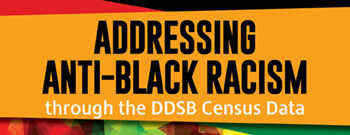Equity & Inclusive Education
The Durham District School Board's vision is that Ontario schools need to be places where everyone can succeed in a culture of high expectations. We strive to have an open and inclusive environment of equity in education in all our schools and for all our students.
The Equity and Diversity Strategic Plan sets out guiding principles and areas of focus for creating safe and inclusive schools for everyone.
The Equity and Inclusive Education policy echoes the Board’s commitment to embracing diverse social realities; while maintaining positive, safe and inclusive environments for all students and staff. The policy is a reflection of Ontario’s Equity and Inclusive Education Strategy, supporting all areas of Durham District School Board principles, practices, and guidelines.
Our goal is to provide students with opportunities to promote equity and social justice.
These resources are intended to help students acquire the knowledge and skills that enable them to challenge unjust practices, and build positive human relationships as members of a global community.
To learn more, the following four guideline documents Accommodating Creed in Schools, Guidelines for Inclusive Language, Supporting Our Transgender Students and Supporting Trans Students in Our Schools have been developed in consultation with staff and community partners to reinforce quality education, as we continually strive to support equitable services, programs and welcoming facilities.
Companion Resource
Addressing Anti-Black Racism
https://youtu.be/bWeEOZpTqUs
The Equity department would like to thank parents/guardians and caregivers for their time to ask questions during the 2019 Census Reporting to the Black Community. The link below will provide access to the questions asked and the responses provided by the Equity Department.
The Equity Department provides the Community with the PowerPoint presentation for the 2019 Census Reporting Session to the Community, highlighting the data about DDSB Black Students.
Human Rights
Durham District School Board (DDSB) recognizes that protecting, upholding and promoting human rights are necessary to:
- Support students’ and employees’ learning and success; and
- Foster a culture of care where students and employees can thrive and have a sense of safety, well-being, engagement and belonging.
DDSB is committed to providing services, employment and learning and working environments that centre human rights and equity and are welcoming, respectful, safe, inclusive, equitable, accessible and free from discrimination, harassment, racism, oppression and harm.
Did you know? The Human Rights Code protects Ontarians from discrimination and harassment in services like school/education and in employment based on prohibited grounds of discrimination: age, ancestry, citizenship, colour, creed/religion, disability, ethnic origin, family status, gender expression, gender identity, marital status, place of origin, race, record of offences (in employment only), sex and sexual orientation.
For more information about Human Rights, Anti-Discrimination and Anti-Racism, visit: the Human Rights Policy page.





